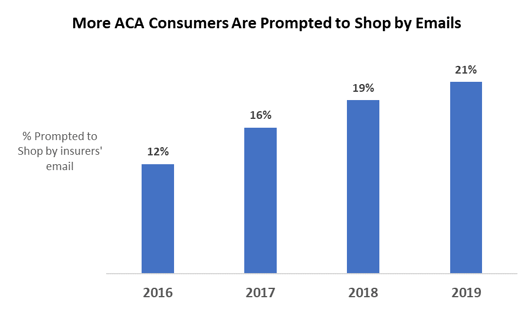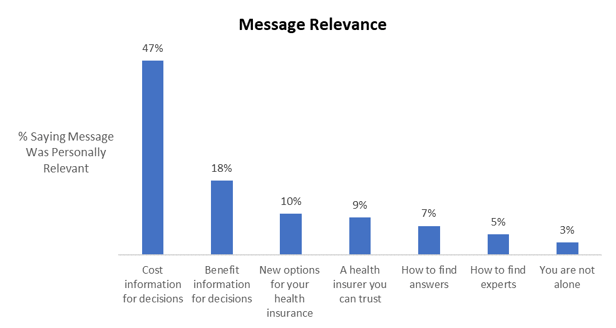As health insurers gear up for the 2020 Open Enrollment Period (OEP) this fall, key trends in how consumers shop for ACA health plans suggest a growing self confidence in the plan selection process. This will have a direct impact on the market’s receptivity to insurance carriers’ advertising efforts.
Specifically, research from Deft Research’s 2019 Individual and Family Plan (IFP) Shopping and Switching Study illustrates an increasing reliance on targeted direct-response marketing from carriers, intimating this channel’s importance in driving ACA plan enrollment during the 2020 OEP season.
Growing Confidence, Self-Reliance in Shopping Process is Increasing the Effectiveness of Direct Response E-Marketing
ACA health plan buyers are increasingly being prompted to shop for health insurance coverage by email marketing they receive directly from insurance carriers. Recent results from Deft’s annual IFP shopping study show a nearly 200% increase over the past four years in the rate ACA buyers claim they were prompted “to look into health insurance” by email from an insurance company (21% in 2019 vs. 12% in 2014). The increase in direct email influence corresponds with declines in the rates of influence of traditional advertising media channels (TV, radio, out-of-home).

Source: 2019 Individual and Family Plan Shopping and Switching Study
Research also shows a decline in friends and family influencing the health plan shopping process, suggesting ACA consumers are more self-confident and more sophisticated at using other information sources than ever before. Greater comfort with information could also be tied to better insurance carrier communications generated by fewer, but more dedicated carriers. We hypothesize that the carriers remaining in the market are better communicators, and, since there are fewer of them, the possibility of generating consumer confusion is reduced.
The research supports a strategy where carriers harness direct, digital channels.
Consumers Want Information Detailing Health Insurance Plan Costs
From an advertising content and messaging standpoint, there is a growing premium on addressing the health plan’s overall cost. For many consumers, easily accessed cost information maximizes the relevancy of health plan advertising. Deft’s recent research shows that roughly half of the ACA market says that “cost information” is the most important ingredient of any advertising communication and a singular point of emphasis for ACA plan consumers. Moreover, the importance of cost information is consistent across various age cohorts and market segments among ACA buyers.

Source: 2019 Individual and Family Plan Shopping and Switching Study
According to ACA plan members, brand trust and access to answers, are secondary factors in driving the personal relevancy of advertising. The muted importance of brand trust/reputation in advertising hints that ACA health plans may represent a commodity marketplace with low brand differentiation and loyalty. It also points to the opportunity that exists for carriers to establish themselves as a brand of choice.
In summary, Deft Research’s 2019 Individual and Family Plan (IFP) Shopping and Switching Study points to a decreasing reliance on outside influences and increasing self-reliance when shopping for health plans. And, the research says that, along with information savviness, comes more intense price sensitivity as evidenced by the increasing influence of plan cost in driving switching behavior.
Adam Wright is a consumer insights and strategy expert with over twenty years of experience as a market research practitioner.

